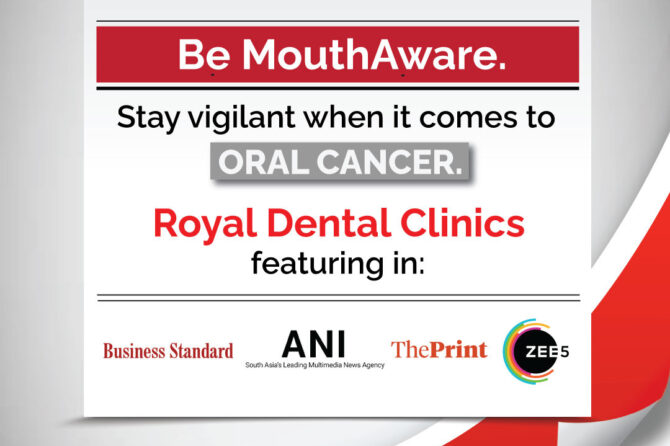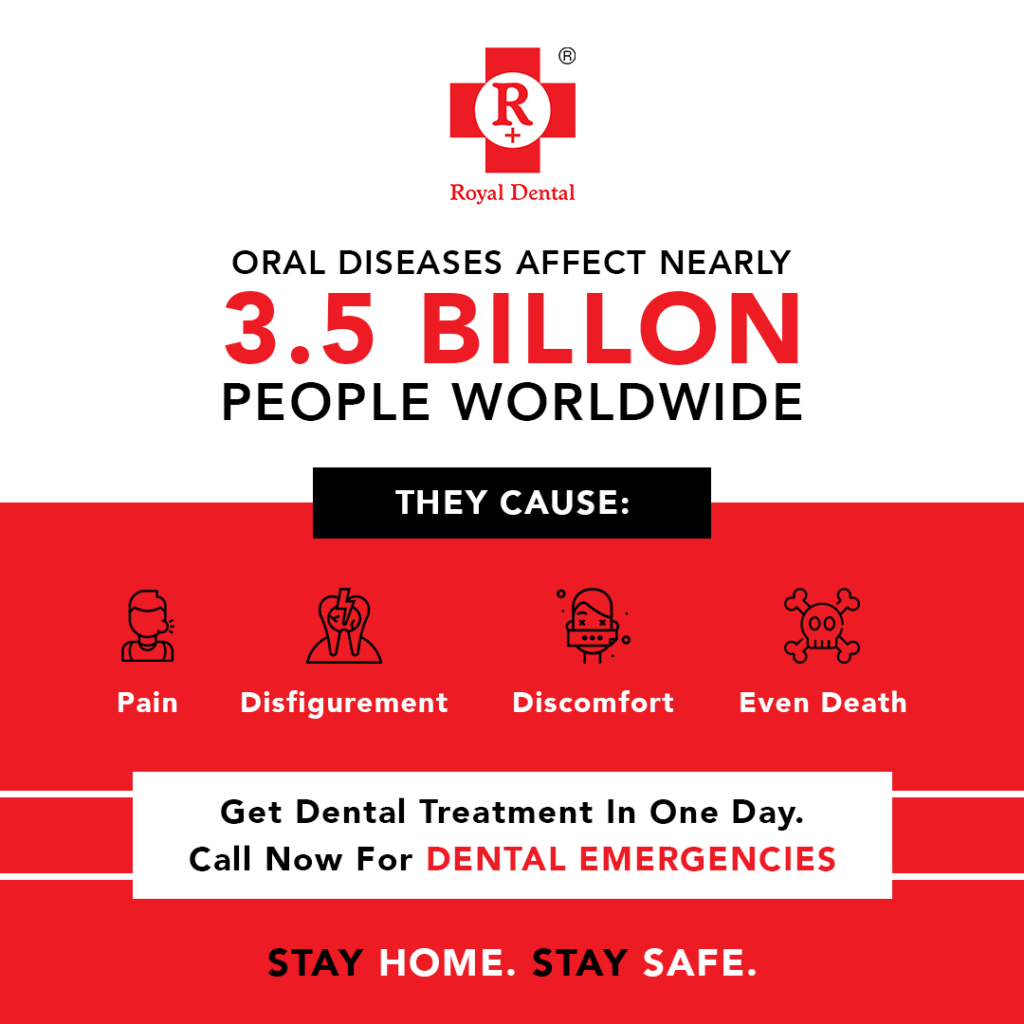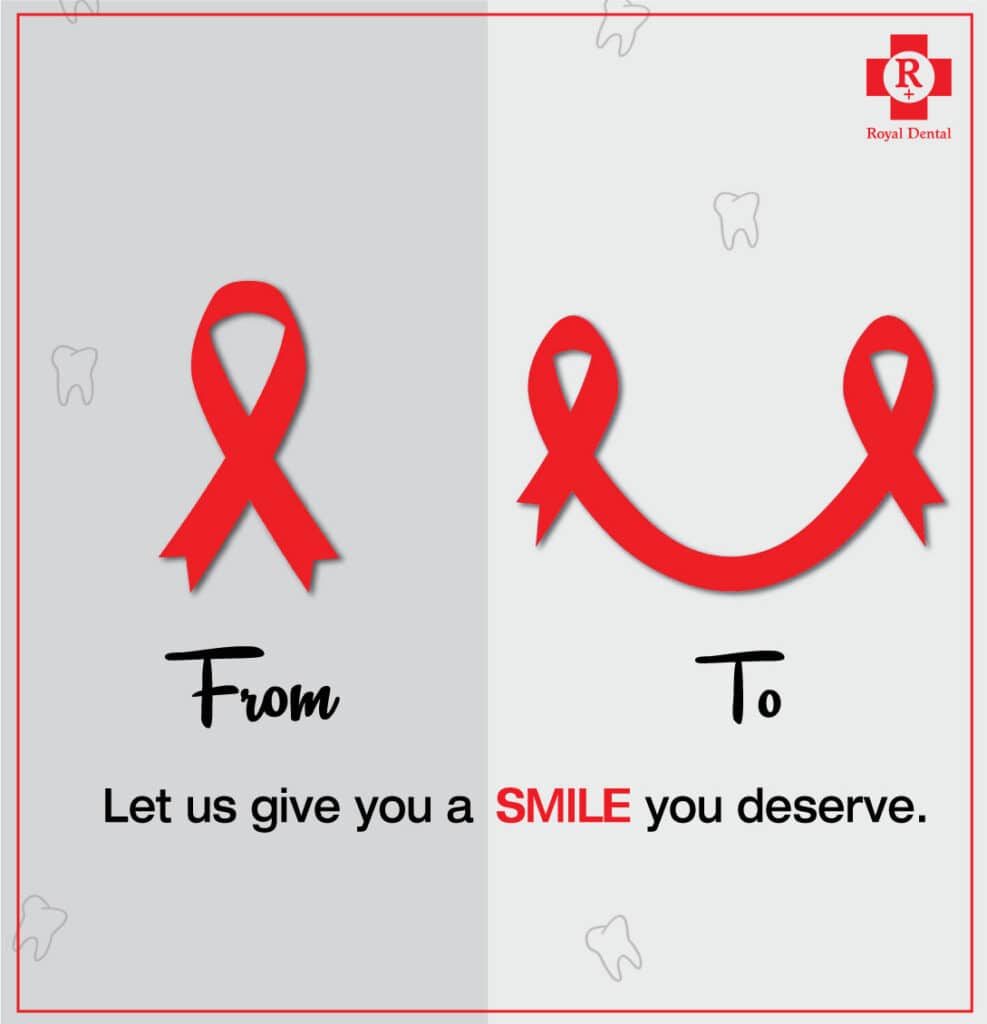
Rebuilding Smiles: Role of Dental Rehabilitation in Oral Cancer Treatment
Royal Dental, a multi-disciplinary institute in the field of Dental and Maxillofacial Surgery, is transforming the treatment of mouth cancer with its innovative solutions. The highly skilled team of surgeons at Royal Dental understand the importance of precision in surgical planning. Combined with Cone Beam Computerised Technology (CBCT) and 3D Printing, they carry out scans of oral cancer-treated jaws and surrounding structures, resulting in precise surgical planning and restoration of facial aesthetics.
Royal Dental is dedicated to providing customized treatment solutions that cater to the unique needs of each patient. Facial transformation surgery is a complex and intricate procedure that involves a combination of various head and neck surgeries for removal of oral cancer and restoration of facial symmetry and teeth. Royal Dental expertise in performing procedures such as full mouth rehabilitation, facelift, browlift, rhinoplasty, blepharoplasty and orthognathic surgery.
From Cancer to Confidence: Restoring Teeth and Aesthetics after Cancer
Dr. Chirag Chamria, a certified Oral and Maxillofacial Surgeon with extensive training in zygomatic implants, cosmetic dentistry, orthognathic surgery, and full mouth and oral cancer rehabilitation, leads the team at Royal Dental. Together, they have developed a cutting-edge treatment flow that utilizes advanced technology such as surgical guides, stents, and the PEEK Framework to restore lost jaws and complete mouth restoration.
“Oral cancers are curable in the first and second stages” says Dr. Chamria. “Our aim is not just to fight cancer, but to reconstruct what is lost. With precise technology we use benefits for not only dental implants but also complete full mouth restoration. Our commitment to research and development and our use of advanced technologies is transforming the field of Dental and Maxillofacial surgery, leading to improved outcomes and quality of life for our patients.“
The team at Royal Dental believes that every patient is different and requires a tailored approach to treatment. To choose the most appropriate procedure for the patient, they carefully assess their facial features and research their needs. It aims to provide a comprehensive facial transformation that highlights the patient’s inherent beauty.
The Importance of Dental Restoration in Oral Cancer Rehabilitation
Royal Dentals is committed to using the latest technology and research to provide patients with the best possible treatment solutions. The institute strives to remain at the forefront of innovation in the field of dental maxillofacial surgery by investing in infrastructure, research, and development.
Apart from facial transformation surgery, Royal Dentals is also dedicated to providing solutions for complex and challenging Dental and Maxillofacial case scenarios. Overall, Royal Dentals stands for quality treatment. With a commitment to providing customized treatment solutions, using the latest technology, and investing in research and development, the institute is a leader in the field of dental maxillofacial surgery. Patients can be rest assured that they will receive the best possible care and achieve their desired look with Royal Dental.
Case 1: Tooth pain diagnosed as Dentigerous Cyst. Dental technology used: CBCT.
Young female patient, 11-year-old was referred to OPD with a minor swelling and dull pain in the left side of jaw for 1-2 months. In CBCT, an approximate size of the lesion is 34mm x 32mm x 26mm was visible. The case challenge was removal of the cyst whilst; preserving the inferior alveolar nerve function and facial symmetry. Dentigerous Cyst was removed with Enucleation technique.
Case 2: Pregnancy induced Gum Disease. Dental Restoration with SAPTeeth.
Middle aged female, H/o of untreated gum disease post pregnancy about 10 years back. Now c/o of bad odour, mobile teeth and low self-esteem during smile. Upon radiological examination, mobile teeth and infected gums were observed. Treatment modality opted was full mouth rehabilitation with restoration in SAPTeeth (Shock Absorbable Permanent Teeth).
Case 3: Treatment for tooth pain with Tongue Lesion. Treatment of care under Conscious Sedation.
63-year-old male, c/o Reduced Mouth opening, Mobile teeth, and difficulty in eating some spices. On examination multiple mobile, and missing teeth were present and a lesion on tongue was present. OPG, MRI and Biopsy was done to rule out any chances of malignancy. Treatment modality involved Full Mouth Rehabilitation with excision of Tongue Lesion. Finally, teeth were restored in SAPTeeth and the tongue margins were free of dysplasia.
60+ year old female, H/o angiosarcoma of face, treated with CT-RT. C/o missing teeth, reduced mouth opening and burning mouth sensation. She had reduced Mouth Opening with limited surgical access, so doctors used an Intraoral Scanner by Medit for final restoration.
New Lease on Life: Restorative Dentistry for Oral Cancer Survivors
After undergoing treatment for oral cancer, including surgical removal, radiation therapy, and/or chemotherapy, patients may experience various changes in their daily lives. These changes may be physical, emotional, or social in nature. Here are some of the ways in which oral cancer patients may have to adjust their lifestyle:
- Dental and Oral Care: Following oral cancer treatment, patients may experience changes in their teeth, gums, and overall oral health. They may require dental restorations, such as dental implants, bridges, or dentures, to replace missing teeth or improve their bite. Patients should also maintain good oral hygiene practices, including brushing and flossing regularly, to prevent further dental issues.
- Diet and Nutrition: Oral cancer treatment can affect a patient’s ability to eat and swallow comfortably. Patients may require a soft or liquid diet for a period of time, which may impact their nutritional intake. It is important for patients to work with a registered dietitian to develop a healthy eating plan that meets their nutritional needs.
- Speech and Communication: Depending on the location and extent of the cancer treatment, patients may experience changes in their speech or ability to communicate. Speech therapy and assistive devices, such as voice amplifiers or communication boards, may be helpful in improving communication skills.
- Emotional and Social Support: Oral cancer treatment can be emotionally and socially challenging for patients. They may experience anxiety, depression, or difficulty adjusting to changes in their appearance or daily routine. Support groups, counselling, and other resources may be available to help patients cope with these issues.
- Follow-Up Care: After treatment, patients at Royal Dental are called for regular follow-up appointments to monitor for any signs of recurrence or complications. They should also continue to practice healthy lifestyle habits, such as not smoking, to reduce their risk of developing oral cancer again in the future.
Overall, oral cancer patients may need to make adjustments to their daily lives to manage the physical and emotional effects of cancer treatment. However, with proper care and support, many patients are able to regain their oral function and quality of life.
Leave a reply


Leave a reply